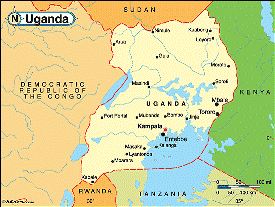In a bid to help Uganda improve heath and productivity in the country’s major towns, the African Development Bank has approved a $62 million concessional loan to finance its Strategic Towns Water Supply and Sanitation Project (STWSSP).
The project, to be implemented in 10 towns spread across the country over a five-year period, is designed to enable the government’s achieve sustainable provision of safe water and sanitation for the urban population by 2030. This in turn will help improved health and productivity in the targeted towns.
Rapid urbanization spurred by economic growth is exerting pressure on Uganda’s water resources and sanitation facilities. Demand for urban services by far outstrips supply due to high urban population growth currently at 5.4%, and inadequate investments in urban infrastructure and services. For example, the lack of sewerage management facilities has led to discharge of untreated effluents creating health hazards like choleras, especially in informal settlement in main urban centers.
The STWSSP will help to tackle these challenges through its three components:
- (i) Urban Water Supply for the development of water supply systems for the selected towns/districts; and support regional water and sanitation authorities for effective utility management
- (ii)) Improved Urban Sanitation and Environmental Management for the development of three regional faecal sludge treatment facilities supported by six desludging units; construction of 40 gender-segregated and disabled-friendly public sanitation facilities; and feasibility designs for climate change resilience
- (iii) Sector Program Support for the regulatory framework and update of tariff policy; preparation of a framework for implementation of bulk water supply; and strengthening sector co-ordination and monitoring systems
Residents in these10 towns will be the primary beneficiaries: Kyenjojo-Katooke (Kyenjojo District), Nakasongola (Nakasongola District), Kayunga-Busana (Kayunga District), Kamuli (Kamuli District), Kapchworwa (Kapchorwa District), Dokolo (Dokolo District), Bundibugyo (Bundibugyo District) and Buikwe (Buikwe District.
On completion, the project will provide access to water and sanitation to 390,000 people by 2023.
About 150 people will receive training in appropriate urban sanitation (masonry/mechanic artisans/waste management), targeting at least 20% women. Sanitation and hygiene sensitization will be conducted in 30 communities (targeting at least 50 % women participation) and support skills development for economic empowerment of 200 youth and women.
The project will contribute to the goals of the Government’s Vision 2040 and the Second National Development Plan (NDP II), which aim to increase access to clean water and sanitation services in the major urban centres and their suburbs to 100% by 2030.
The STWSSP complements the Bank’s previous engagements such as the Small Towns Water and Sanitation Project, Kampala Sanitation Project, Kampala Urban Poor Project, Lake Victoria Water Supply and Sanitation Program, and Water Supply and Sanitation Program phase I and II.
The project, aligned to the Bank’s Uganda Country Strategy for 2017-2021, will accelerate the implementation of its Ten-Year Strategy, 2013-2022 as well as the High5 priority of Improving the Quality of life for the people of Africa.
The STWSSP is estimated to cost US$ 69.34 million, of which African Development Fund (ADF), will provide US$ 62.33 million, and US$ 6.94 million counterpart contribution from the Government of Uganda.

